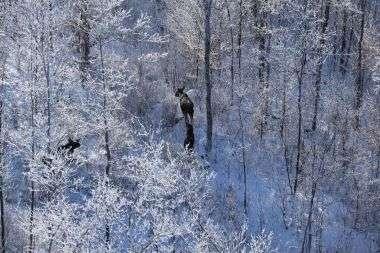News

News
April 26, 2023
As the son of two veterinarians, Nate LaHue, DVM ’13, was exposed to veterinary medicine his whole life, though his interests never meshed with small animal practice. It was during his undergraduate years that he realized he could combine his interest in veterinary medicine with his passion for wildlife.

April 24, 2023
A beloved tradition returned to Cornell University’s College of Veterinary Medicine this past week. After a three-year, pandemic-induced hiatus, the college invited the community to its 54th annual Open House.

For Your Information
April 21, 2023
The contraction of the global tiger population over the last 100 years into small, often isolated subpopulations has made them increasingly vulnerable to the impact of disease. Despite this, the health of wild tigers continues to be insufficiently funded and explored.

March 30, 2023
In recognition of their outstanding scholarship and service, multiple members of the Cornell University College of Veterinary Medicine faculty have been granted named professorships, including Drs. Raina Plowright and Gary Whittaker.

March 28, 2023
In 2022, Peregrine “Peri” Wolff, DVM ‘84, was invited to serve on the Cornell University College of Veterinary Medicine Advisory Council and the Women’s Engagement & Philanthropy Initiative, supporting Cornell's focus on wildlife health and its connections to public, domestic animal and environmental health.

News
March 20, 2023
Danielle Sosnicki is a Biomedical & Biological Sciences PhD Candidate in the Travis Lab at the Cornell University College of Veterinary Medicine. She is studying mechanisms that are involved in the maturation and function of sperm, with a concentration in Zoology and Wildlife Conservation.

For Your Information
March 14, 2023
Canine distemper virus is a global multi-host pathogen that can be fatal in a range of species. This latest study shows that the presence of free-roaming dogs around protected areas in Nepal could represent a source of infectious disease for transmission to local wildlife, including endangered tigers.

March 08, 2023
An investigation conducted by ProPublica found that deforestation could increase the risk of Ebola spilling over into people at several sites in Africa. As part of their research, ProPublica consulted with Cornell's Dr. Raina Plowright, who is also a senior author of the theoretical model used in their analysis.

March 02, 2023
Cornell scientists have been part of a multiphase project looking at factors influencing reproductive and survival rates of adult moose, availability of moose habitat and population estimates.

February 21, 2023
Cornell researchers have confirmed the first cases of canine distemper virus in tigers and leopards in Nepal. This is significant, as both populations are already threatened and the virus can cause fatal neurological disease.
